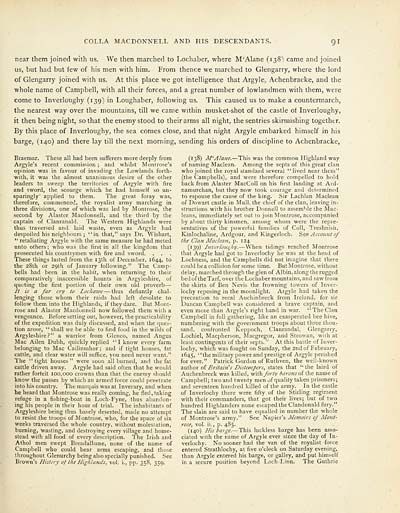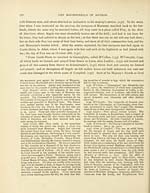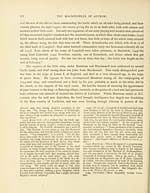Historical account of the Macdonnells of Antrim
(105) Page 91
Download files
Complete book:
Individual page:
Thumbnail gallery: Grid view | List view

COLLA MACDONNELL AND HIS DESCENDANTS.
91
near them joined with us. We then marched to Lochaber, where M'Alane (138^ came and joined
us, but had but few of his men with him. From thence we marched to Glengarry, where the lord
of Glengarry joined with us. At this place we got intelligence that Argyle, Achenbracke, and the
whole name of Campbell, with all their forces, and a great number of lowlandmen with them, were
come to Inverloughy (139) in Loughaber, following us. This caused us to make a countermarch,
the nearest way over the mountains, till we came within musket-shot of the castle of Inverloughy,
it then being night, so that the enemy stood to their arms all night, the sentries skirmishing together.
By this place of Inverloughy, the sea comes close, and that night Argyle embarked himself in his
barge, (140) and there lay till the next morning, sending his orders of discipline to Achenbracke,
Braemar. These all had been sufferers more deeply from
Argyle's recent commission ; and whilst Montrose's
opinion was in favour of invading the Lowlands forth-
with, it was the almost unanimous desire of the other
leaders to sweep the territories of Argyle with fire
and sword, the scourge which he had himself so un-
sparingly applied to them. The great foray was,
therefore, commenced, the royalist army marching in
three divisions, one of which was led by Montrose, the
second by Alaster Macdonnell, and the third by the
captain of Clanranald. The Western Highlands were
thus traversed and laid waste, even as Argyle had
despoiled his neighbours ; "in that, " says Dr. Wishart,
" retaliating Argyle with the same measure he had meted
unto others ; who was the first in all the kingdom that
prosecuted his countrymen with fire and sword.
These things lasted from the 13th of December, 1644, to
the 28th or 29th of January following." The Camp-
bells had been in the habit, when returning to their
comparatively inaccessible haunts in Argyleshire, of
quoting the first portion of their own old proverb —
It is a far cry to Loehawe — thus defiantly chal-
lenging those whom their raids had left desolate to
follow them into the Highlands, if they dare. But Mont-
rose and Alaster Macdunnell now followed them with a
vengeance. Before setting out, however, the practicability
of the expedition was duly discussed, and when the ques-
tion arose, "shall we be able to find food in the wilds of
Argyleshire?" a warrior from Glenco, named Angus
Mac Ailen Dubh, quickly replied "I know every farm
belonging to Mac Cailinmhor ; and if tight houses, fat
cattle, and clear water will suffice, you need never want."
The "tight houses" were soon all burned, and the fat
cattle driven away. Argyle had said often that he would
rather forfeit 100,000 crowns than that the enemy should
know the passes by which an armed force could penetrate
into his country. The marquis was at Inverary, and when
he heard that Montrose was really coming, he fled, taking
refuge in a fishing-boat in Loch-Fyne, thus abandon-
ing his people in their hour of trial. The inhabitants of
Argyleshire being thus basely deserted, made no attempt
to resist the troops of Montrose, who, for the space of six
weeks traversed the whole country, without molestation,
burning, wasting, and destroying every village and home-
stead with all food of every description. The Irish and
Athol men swept Breadalbane, none of the name of
Campbell who could bear arms escaping, and those
throughout Glenurchy being also specially punished. See
Brown's History of the Highlands, vol. i., pp. 358, 359.
(138) M'Alane. — This was the common Highland way
of naming Maclean. Among the septs of this great clan
who joined the royal standard several "lived near them"
(the Campbells), and were therefore compelled to hold
back from Alaster MacColl on his first landing at Ard-
namurchan, but they now took courage and determined
to espouse the cause of the king. Sir Lachlan Maclean
of Dowart castle in Mull, the chief of the clan, leaving in-
structions with his brother Donnell to assemble the Mac-
leans, immediately set out to join Montrose, accompanied
by about thirty kinsmen, among whom were the repre-
sentatives of the powerful families of Coll, Treshnish,
Kinlochaline, Ardgour, and Kingerloch. See. Account of
the Clan Maclean, p. 124
(139) Inverloughy. — When tidings reached Montrose
that Argyle had got to Inverlochy he was at the head of
Lochness, and the Campbells did not imagine that there
could be a collision for some time. But Montrose, without
delay, marched through the glen of Albin, along the rugged
bed of the Tarf, over the Lochaber mountains, and saw from
the skirts of Ben Nevis the frowning towers of Inver-
lochy reposing in the moonlight. Argyle had taken the
precaution to recal Auchinbreck from Ireland, for sir
Duncan Campbell was considered a brave captain, and
even mote than Argyle's right hand in war. "The Clan
Campbell in full gathering, like an exasperated bee hive,
numbering with the government troops about three thou-
sand, confronted Keppoch, Clanrandal, Glengarry,
Lochiel, Macpherson, Macgregor, and Strowan, with at
least contingents of their septs." At this battle of Inver-
lochy, which was fought on Sunday, the 2nd of February,
1645, "the military power and prestige of Argyle perished
forever." Patrick Gordon of Ruthven, the well-known
author of Britain's Distempers, states that " the laird of
Auchenbreck was killed, with forty raronso! the name of
Campbell; two and twenty men of quality taken prisoners;
and seventeen hundred killed of the army. In the castle
of Inverlochy there were fifty of the Stirling regiment
with their commanders, that got their lives; but of two
hundred Highlanders none escaped the Clandonald fury."
The slain are said to have equalled in number the whole
of Montrose's army." See Napier's Memoirs of Mont-
rose, vol. ii., p. 485.
(140) His liarge. — This luckless barge has been asso-
ciated with the name of Argyle ever since the day of In-
verlochy. No sooner had the van of the royalist force
entered Strathlochy, at five o'clock on Saturday evening,
than Argyle entered his barge, or galley, and put himself
in a secure position beyond Loch-Linn. The Guthrie
91
near them joined with us. We then marched to Lochaber, where M'Alane (138^ came and joined
us, but had but few of his men with him. From thence we marched to Glengarry, where the lord
of Glengarry joined with us. At this place we got intelligence that Argyle, Achenbracke, and the
whole name of Campbell, with all their forces, and a great number of lowlandmen with them, were
come to Inverloughy (139) in Loughaber, following us. This caused us to make a countermarch,
the nearest way over the mountains, till we came within musket-shot of the castle of Inverloughy,
it then being night, so that the enemy stood to their arms all night, the sentries skirmishing together.
By this place of Inverloughy, the sea comes close, and that night Argyle embarked himself in his
barge, (140) and there lay till the next morning, sending his orders of discipline to Achenbracke,
Braemar. These all had been sufferers more deeply from
Argyle's recent commission ; and whilst Montrose's
opinion was in favour of invading the Lowlands forth-
with, it was the almost unanimous desire of the other
leaders to sweep the territories of Argyle with fire
and sword, the scourge which he had himself so un-
sparingly applied to them. The great foray was,
therefore, commenced, the royalist army marching in
three divisions, one of which was led by Montrose, the
second by Alaster Macdonnell, and the third by the
captain of Clanranald. The Western Highlands were
thus traversed and laid waste, even as Argyle had
despoiled his neighbours ; "in that, " says Dr. Wishart,
" retaliating Argyle with the same measure he had meted
unto others ; who was the first in all the kingdom that
prosecuted his countrymen with fire and sword.
These things lasted from the 13th of December, 1644, to
the 28th or 29th of January following." The Camp-
bells had been in the habit, when returning to their
comparatively inaccessible haunts in Argyleshire, of
quoting the first portion of their own old proverb —
It is a far cry to Loehawe — thus defiantly chal-
lenging those whom their raids had left desolate to
follow them into the Highlands, if they dare. But Mont-
rose and Alaster Macdunnell now followed them with a
vengeance. Before setting out, however, the practicability
of the expedition was duly discussed, and when the ques-
tion arose, "shall we be able to find food in the wilds of
Argyleshire?" a warrior from Glenco, named Angus
Mac Ailen Dubh, quickly replied "I know every farm
belonging to Mac Cailinmhor ; and if tight houses, fat
cattle, and clear water will suffice, you need never want."
The "tight houses" were soon all burned, and the fat
cattle driven away. Argyle had said often that he would
rather forfeit 100,000 crowns than that the enemy should
know the passes by which an armed force could penetrate
into his country. The marquis was at Inverary, and when
he heard that Montrose was really coming, he fled, taking
refuge in a fishing-boat in Loch-Fyne, thus abandon-
ing his people in their hour of trial. The inhabitants of
Argyleshire being thus basely deserted, made no attempt
to resist the troops of Montrose, who, for the space of six
weeks traversed the whole country, without molestation,
burning, wasting, and destroying every village and home-
stead with all food of every description. The Irish and
Athol men swept Breadalbane, none of the name of
Campbell who could bear arms escaping, and those
throughout Glenurchy being also specially punished. See
Brown's History of the Highlands, vol. i., pp. 358, 359.
(138) M'Alane. — This was the common Highland way
of naming Maclean. Among the septs of this great clan
who joined the royal standard several "lived near them"
(the Campbells), and were therefore compelled to hold
back from Alaster MacColl on his first landing at Ard-
namurchan, but they now took courage and determined
to espouse the cause of the king. Sir Lachlan Maclean
of Dowart castle in Mull, the chief of the clan, leaving in-
structions with his brother Donnell to assemble the Mac-
leans, immediately set out to join Montrose, accompanied
by about thirty kinsmen, among whom were the repre-
sentatives of the powerful families of Coll, Treshnish,
Kinlochaline, Ardgour, and Kingerloch. See. Account of
the Clan Maclean, p. 124
(139) Inverloughy. — When tidings reached Montrose
that Argyle had got to Inverlochy he was at the head of
Lochness, and the Campbells did not imagine that there
could be a collision for some time. But Montrose, without
delay, marched through the glen of Albin, along the rugged
bed of the Tarf, over the Lochaber mountains, and saw from
the skirts of Ben Nevis the frowning towers of Inver-
lochy reposing in the moonlight. Argyle had taken the
precaution to recal Auchinbreck from Ireland, for sir
Duncan Campbell was considered a brave captain, and
even mote than Argyle's right hand in war. "The Clan
Campbell in full gathering, like an exasperated bee hive,
numbering with the government troops about three thou-
sand, confronted Keppoch, Clanrandal, Glengarry,
Lochiel, Macpherson, Macgregor, and Strowan, with at
least contingents of their septs." At this battle of Inver-
lochy, which was fought on Sunday, the 2nd of February,
1645, "the military power and prestige of Argyle perished
forever." Patrick Gordon of Ruthven, the well-known
author of Britain's Distempers, states that " the laird of
Auchenbreck was killed, with forty raronso! the name of
Campbell; two and twenty men of quality taken prisoners;
and seventeen hundred killed of the army. In the castle
of Inverlochy there were fifty of the Stirling regiment
with their commanders, that got their lives; but of two
hundred Highlanders none escaped the Clandonald fury."
The slain are said to have equalled in number the whole
of Montrose's army." See Napier's Memoirs of Mont-
rose, vol. ii., p. 485.
(140) His liarge. — This luckless barge has been asso-
ciated with the name of Argyle ever since the day of In-
verlochy. No sooner had the van of the royalist force
entered Strathlochy, at five o'clock on Saturday evening,
than Argyle entered his barge, or galley, and put himself
in a secure position beyond Loch-Linn. The Guthrie
Set display mode to:
![]() Universal Viewer |
Universal Viewer | ![]() Mirador |
Large image | Transcription
Mirador |
Large image | Transcription
Images and transcriptions on this page, including medium image downloads, may be used under the Creative Commons Attribution 4.0 International Licence unless otherwise stated. ![]()
| Histories of Scottish families > Historical account of the Macdonnells of Antrim > (105) Page 91 |
|---|
| Permanent URL | https://digital.nls.uk/95342507 |
|---|
| Description | A selection of almost 400 printed items relating to the history of Scottish families, mostly dating from the 19th and early 20th centuries. Includes memoirs, genealogies and clan histories, with a few produced by emigrant families. The earliest family history goes back to AD 916. |
|---|

